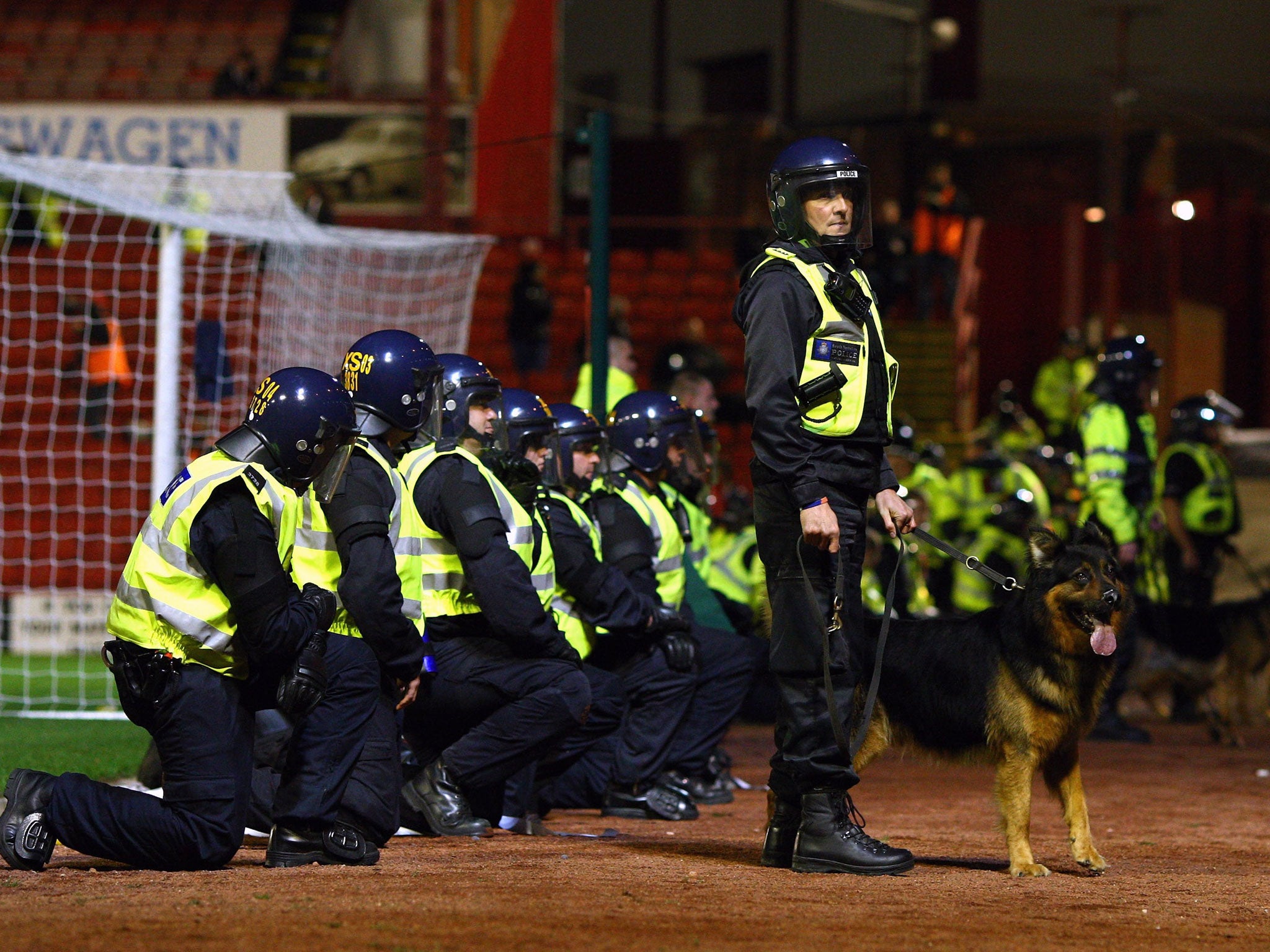Case of Manchester United fan shows how far hooligans will go to skip bans
Arrest of supporter for flouting his banning order across Europe shows the game's scourge is far from eradicated

The scourge of hooliganism has been largely driven out of British football, by a combination of factors including better facilities and the determination of supporters to put those days in the past. Periodically there will be an incident – like the attack on Sheffield Wednesday's Chris Kirkland by a Leeds United fan at Hillsborough a year ago – which will prompt the latest bout of ridiculous hyperbole. Turn to the Home Office website for the real story. The data on "football-related offences" reveals there was just one arrest for every 14,000 fans who watched football last season.
The propagators of violence are the ones whom the officers of the UK Football Policing Unit are concerned about. Banning orders of between three and five years are the unit's way of keeping the ringleaders away from the games – and the case of businessman and Manchester United fan Paul Hodgson reveals the lengths to which some will go to avoid them.
The orders compel fans to demonstrate they are in the United Kingdom when their team are playing abroad, though they can seek exemptions if they need to be outside of the country for other reasons. When United played Cluj in Romania in October last year, 48-year-old Hodgson told the authorities he needed to be in Rimini, Italy – and after flying there, he made the 850-mile, 14-hour trip to get to see United. When it came to the club's Champions League round of 16 match in Madrid, he flew to Geneva "on business" and proceeded across land. For last month's tie in Donetsk, his "business" was in Milan. And for the most recent match against Real Sociedad in San Sebastian, it was Bremen. In all, he travelled 1,700 miles.
United play their part in helping to prevent the 91 supporters of their club who are currently under banning orders from travelling to Europe with them. They stipulate that those seeking tickets first apply – stating their name – for vouchers, which they must present with their passport at a ticket collection point in the designated European location.
Hodgson got lucky where this part of the process was concerned. The court on Tyneside which dealt with his original offence – throwing a coin – did not pass on his name to Manchester police, so United were none the wiser.
He was rumbled before the Sociedad game, when police and the Football Association noticed he was applying for the exemptions which allowed him to travel to Europe every time United were playing. He was supposed to be in Bremen on business but Basque police had CCTV footage of him leaving the ticket collection point in a panic, seemingly suspecting detection. When they called his mobile, he said he was in Germany "on business." Officers told him what they knew and Hodgson agreed to present himself to Salford police on his return to England.
Banning orders are deeply contentious. The Football Supporters' Federation (FSF) has profound concerns that some forces are applying them for low-level public order offences such as swearing, gesturing at opposing fans or even entering a ground drunk – which can lead to an order.
The loathed practice of videoing innocent supporters as they watch games is understandably considered by many to be an infringement of civil liberties. The case of Hodgson, who took planes and trains to get to matches, is exceptional. Few supporters would have the money or inclination to make those journeys. But the Greater Manchester force is dealing with another four cases of fans who have breached orders, demonstrating that this way of keeping the hard core away does need a police resource behind it.
Out of order: Premier League bans
Manchester United top the table for banning orders imposed on Premier League supporters in the last year:
Manchester United 17
West Ham United 14
Chelsea 12
Manchester City 11
Sunderland 10
Hull City 9
Arsenal, Liverpool, Newcastle 8
Swansea City 7
Aston Villa, West Bromwich 6
Everton, Stoke City 5
Cardiff, Crystal Palace, Spurs 4
Norwich City 1
Fulham, Southampton 0
Most Football League bans:
Bristol City 34
Scunthorpe United 27
Leeds United 24
Millwall 23
Source: Home Office statistics
Join our commenting forum
Join thought-provoking conversations, follow other Independent readers and see their replies
Comments
Bookmark popover
Removed from bookmarks